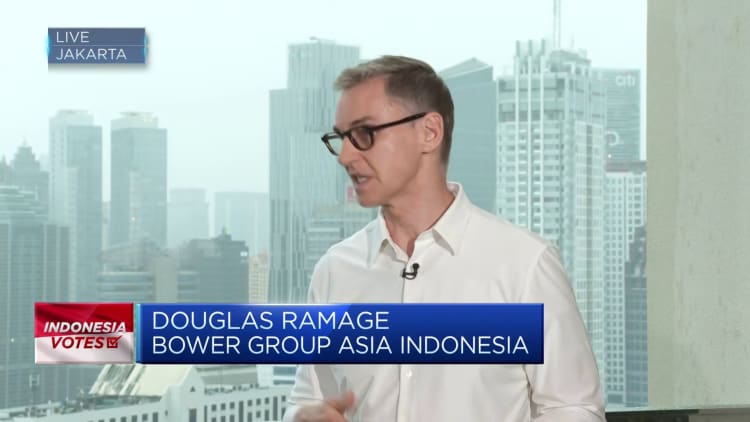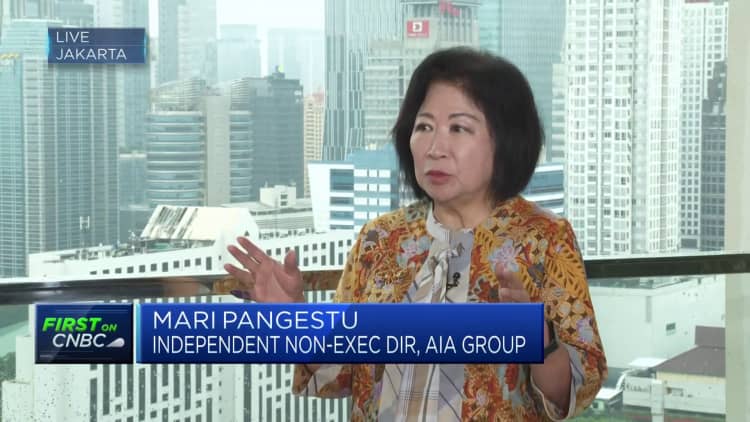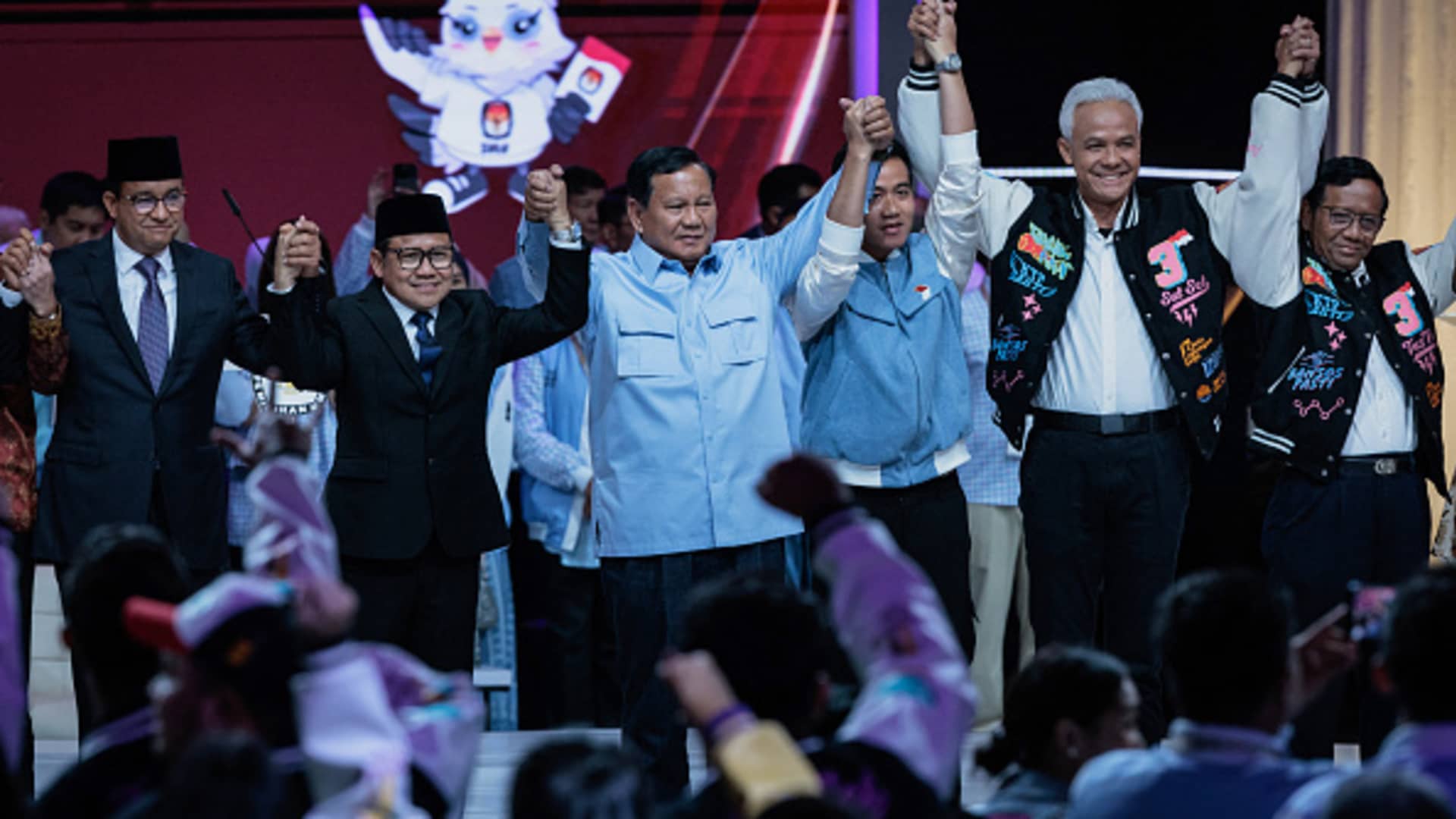Presidential candidate and former Jakarta governor Anies Baswedan, vice presidential candidate Muhaimin Iskandar, presidential candidate and Indonesia’s Defence Minister Prabowo Subianto, vice presidential candidate Gibran Rakabuming Raka, presidential candidate and former Central Java governor Ganjar Pranowo and vice presidential candidate Mahfud MD (from left to right) react on the stage during the last presidential election debate at the Jakarta Convention Center in Jakarta on February 4, 2024.
Yasuyoshi Chiba | AFP | Getty Images
More than 200 million voters in Indonesia are heading to more than 800,000 polling stations in the world’s third-largest democracy on Wednesday to elect President Joko Widodo’s successor, a new national House of Representatives and various local legislators.
Defense Minister Prabowo Subianto, 72, is the frontrunner in what could be the former army general’s last attempt at seeking the highest political office in the world’s most populous Muslim country, according to various opinion polls ahead of the Feb. 14 vote. Widodo, also popularly known as Jokowi, beat Prabowo in the last two presidential elections.
The outcome of these elections could go some way in affecting Indonesia’s nascent democracy, while determining whether Southeast Asia’s largest economy will attain developed status by 2045. It’s also unclear if the new president would derail the relocation of the national capital from Jakarta to Nusantara or curtail Jokowi’s ambitions of turning Indonesia into a global hub for battery manufacturing.
“It is [Prabowo’s] election to lose, but that doesn’t mean he’s going to win this fast,” Richard Borsuk, an adjunct senior fellow at Nanyang Technological University’s Rajaratnam School of International Studies, told CNBC “Squawk Box Asia” last week.
Some of the latest opinion polls showed Prabowo netting more than 50% of the vote against two other opponents. Prabowo was nominated by his Gerindra Party.
To win outright, a pair must obtain more than 50% of the national vote and at least 20% of ballots cast in more than half of the 38Â provinces in Indonesia on Wednesday. If no pair achieves this, Indonesians across the world’s largest archipelagic state, spanning more than 17,000 islands, will head to a runoff in June between the two best performing pairings.
Voters have six hours to cast their five ballots for their preferred presidential and vice presidential pairing, as well as legislators at the national, provincial and regency level, along with a regional senator for the national parliament.
Polling stations will open Wednesday at 7 a.m. and close at 1 p.m. local time across Indonesia’s three time zones. Preliminary results may be available within the day, but official results may not be due up to a month later.

Former Jakarta governor Anies Baswedan is running for president with the backing of three parties, including the secular Nasdem Party in the ruling coalition and the conservative Islamic Prosperous Justice Party (PKS). Muhaimin Iskandar, better known as Cak Imin and head of the National Awakening Party (PKB) is his vice-presidential running mate.
The former governor of Central Java Ganjar Pranowo was nominated by the Indonesian Democratic Party of Struggle (PDI-P) as its presidential candidate, alongside Mohammad Mahfud Mahmodin as his vice-presidential running mate.
In Indonesia, only coalitions or individual political parties with at least 20% of the seats in the House of Representatives or a quarter of the popular vote from the previous House of Representatives election may propose presidential and vice-presidential candidate pairings.
Prabowo’s military past
Jokowi is not running again after serving the maximum two five-year terms. His eldest son and current mayor of Surakarta or Solo, Gibran Rakabuming Raka, though is Prabowo’s running mate. Gibran, 36, was added to the ticket after laws were amended to allow candidates below 40 years old to run for president or vice president if they have held regional office.
“The theme of the Prabowo’s camp is continuity, there will be a fair bit of that, but I find it hard to believe that Prabowo won’t want to make his own mark. He’s been running for president for an awful long time, he comes out of a military background,” said Borsuk from NTU’s RSIS.
Prabowo was once an Indonesian special forces commander. He was dishonorably discharged from the military in 1998 after troops under his command allegedly captured and tortured democracy activists opposed to the dictatorship of President Suharto, his father-in-law, ahead of riots that preceded the start of democratic reforms in the world’s fourth most populous nation.

Prabowo has also been accused of leading a massacre of hundreds in East Timor in 1983. Decades later, he has been rebranded as a “cute” grandpa as his campaign features his awkward dance moves on social media, endearing him to young voters.
More than half of Indonesia’s electorate was born after 1980. The minimum voting age is 17.
“There’s a bona fide concern he will roll back some of the democratic norms that Indonesia has worked on since Suharto,” Borsuk added.
Jokowi’s economic legacy
Despite previous animosity between the two, Prabowo has pledged to continue with Jokowi’s popular economic reform agenda.
“During his decade in power Jokowi has introduced several important reforms that have boosted the economy’s long-run prospects, including a radical shake-up of the country’s labor market and increased spending on infrastructure,” Gareth Leather, senior Asia economist at Capital Economics, wrote in a note dated Feb. 7.
The manner by which Jokowi’s son was nominated as Prabowo’s vice-presidential running mate has attracted criticism of nepotism, but seen as Jokowi’s attempt to ensure some continuity of his policies.

“Regardless of who wins, the new government will face medium-term structural constraints including flagging revenue ratios, spending inefficiencies (still-high subsidies vs. productive infrastructure spending), and over-reliance on commodities,” Goldman Sachs economists led by Rina Jio wrote in a Dec. 14 note.
There will likely be more policy uncertainty in 2025 after the new administration is inaugurated Oct. 1 this year, they added.
Goldman Sachs economists said these may include the potential discontinuation of the new capital city project, potential attempts to loosen the fiscal deficit cap â currently w pegged at 3% of GDP â and a potential lower rate of inflation, should the new government decide to scrap the proposed 1 percentage point increase in value added tax that’s scheduled to start Jan. 1, 2025.
“For now, given that the candidates seemingly run on similar economic platforms, we think the very near-term economic and market implications are limited,” they said.
â CNBC’s Celestine Francis Xavier contributed to this story.
Correction: This story was updated to correct the spelling of Ganjar Pranowo and Prabowo Subianto’s names.
